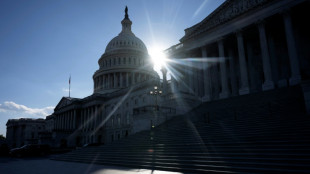

Rubio hails end of USAID as Bush, Obama deplore cost in lives
The US foreign aid agency formally closed down Tuesday, with President Donald Trump's administration trumpeting the end of the "charity-based model" despite predictions that millions of lives will be lost.
Founded in 1961 as John F. Kennedy sought to leverage aid to win over the developing world in the Cold War, the US Agency for International Development (USAID) has now been incorporated into the State Department -- after Secretary of State Marco Rubio slashed 85 percent of its programming.
In a farewell to remaining staff on Monday, former presidents George W. Bush and Barack Obama -- as well as U2 frontman Bono -- saluted their work and said it was still needed.
Bush pointed to PEPFAR, the massive US effort to fight HIV/AIDS that he considers one of the top achievements of his 2001-2009 Republican presidency.
"This program shows a fundamental question facing our country -- is it in our nation's interest that 25 million people who would have died now live? I think it is," Bush said in a video message seen by AFP.
Obama, who like Bush has been sparing in openly criticizing Trump, said that ending USAID was "inexplicable" and "will go down as a colossal mistake."
"Gutting USAID is a travesty and it is a tragedy because it's some of the most important work happening anywhere in the world," the Democrat said.
A study published in the medical journal The Lancet predicted that more than 14 million people would die, a third of them small children, by 2030 due to the foreign aid cuts.
- 'Little to show' -
Rubio painted a drastically different picture of USAID, which was an early target of a sweeping government cost-cutting drive led for Trump by billionaire Elon Musk.
Rubio said that USAID's "charity-based model" fueled "addiction" by developing nations' leaders and that trade was more effective.
"Beyond creating a globe-spanning NGO industrial complex at taxpayer expense, USAID has little to show since the end of the Cold War," Rubio wrote in an essay.
He also complained that many recipients of US aid do not vote with the United States at the United Nations and that rival China often enjoys higher favorability among the public.
A senior State Department official, speaking on condition of anonymity, said that The Lancet study relied on "incorrect assumptions" and said the United States will continue aid but in a "more efficient" way.
He said that PEPFAR will remain, with a priority on stopping HIV transmission from mothers to children.
But he acknowledged the United States was no longer funding PrEP medication, which significantly reduces the rate of HIV transmission and has been encouraged by high-risk communities.
"No one is saying that gay men in Africa shouldn't be on PrEP. That's wonderful. It doesn't mean that the United States has to pay for every single thing," the official said.
He said the Trump administration was looking at "new and innovative solutions" and pointed to food deliveries in war-battered Gaza staffed by US military contractors and surrounded by Israeli troops.
Witnesses, the United Nations and local Gaza officials have reported that Israeli troops have repeatedly opened fire and killed Palestinians waiting for aid -- although the US-backed initiative, the Gaza Humanitarian Foundation, denies any deadly incidents.
- 'No line of defense' -
Bob Kitchen, the vice president for emergencies at the International Rescue Committee, said that the 14 million death prediction was consistent with what the humanitarian group was seeing.
Among the group's programming that was funded through USAID, he said that nearly 400,000 refugees who fled the war in Sudan have now been deprived of acute aid and that more than 500,000 Afghans, mostly women and girls, have been cut off from education and healthcare.
European Union nations and Britain, rather than filling the gap, have also stepped back as they ramp up defense spending with encouragement from Trump.
Kitchen warned that cuts will not only worsen frontline emergencies but weaken more stable countries such as Ethiopia and Kenya, which will have no back-up if rains fail again.
Kitchen said that, beyond moral considerations, the cuts will aggravate migration, a top consideration for Trump.
"It's self-interest. If insecurity spreads, outbreaks spread, there's no line of defense anymore."
H.Vega--GBA



